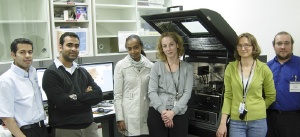Asylum Research and the Natural History Museum of London announced today that the Museum's Mineralogy Department has acquired Asylum’s MFP-3D Stand Alone Atomic Force Microscope (AFM) to expand on their range of research tools to study nanomaterials. The focus of the research, led by Dr. Éva Valsami-Jones, is the evaluation of the fundamental physical and chemical properties of nanoparticles to assess how these properties change as particle size decreases, the links between natural minerals and manufactured nanoparticles, and the implications for human health, other organisms, and the natural world.
 Shown with the MFP-3D AFM are Amir Moshar of Asylum Research, Superb Misra, Deborah Berhanu, Éva Valsami-Jones, and Agnes Dybowska of the Museum of Natural History, and Mick Phillips of Asylum Research.
Shown with the MFP-3D AFM are Amir Moshar of Asylum Research, Superb Misra, Deborah Berhanu, Éva Valsami-Jones, and Agnes Dybowska of the Museum of Natural History, and Mick Phillips of Asylum Research.
Commented Dr. Valsami-Jones, “We chose Asylum’s MFP-3D AFM because we found it to be the most powerful and easy to use AFM available. It is the only system capable of imaging complex samples with very rough topographies at the nanoscale, and we were impressed by its excellent optics for locating areas of interest for AFM scanning. Sample loading and unloading and tip exchange are faster and more intuitive, and the post-data collection processing capabilities are clearly superior. We are excited about applying the MFP-3D to our nanotoxicology research initially and to other Museum studies in the near future.”
Added Dr. Chris Mulcahy, Asylum UK Managing Director, “We are proud that the MFP-3D has been selected by the Natural History Museum, one of the most prestigious organizations in the world for scientific research of the natural world. Their research on the effects and potential toxicity of nanoparticles is a critical area of study for human and environmental health and we at Asylum Research are pleased to be a part of that research.”
The Natural History Museum is an international leader in the scientific study of the natural world. Gathering knowledge about nature for over 250 years, the Museum is one of the world’s premier institutions for naming, describing and classifying the living, fossil and mineral diversity on Earth. More than 300 scientists in the Museum’s five science departments promote understanding of the processes which have resulted in nature’s diversity, and develop knowledge that supports anticipation and management of the impact of human activity on the environment.
They help to tackle a diverse range of global problems, such as threats to the Earth's biodiversity, the maintenance of delicate ecosystems, natural hazards, environmental pollution and disease. The Museum’s collections of 70 million animal, plant, mineral, rock and fossil specimens are vital resource for research and understanding of the natural world.